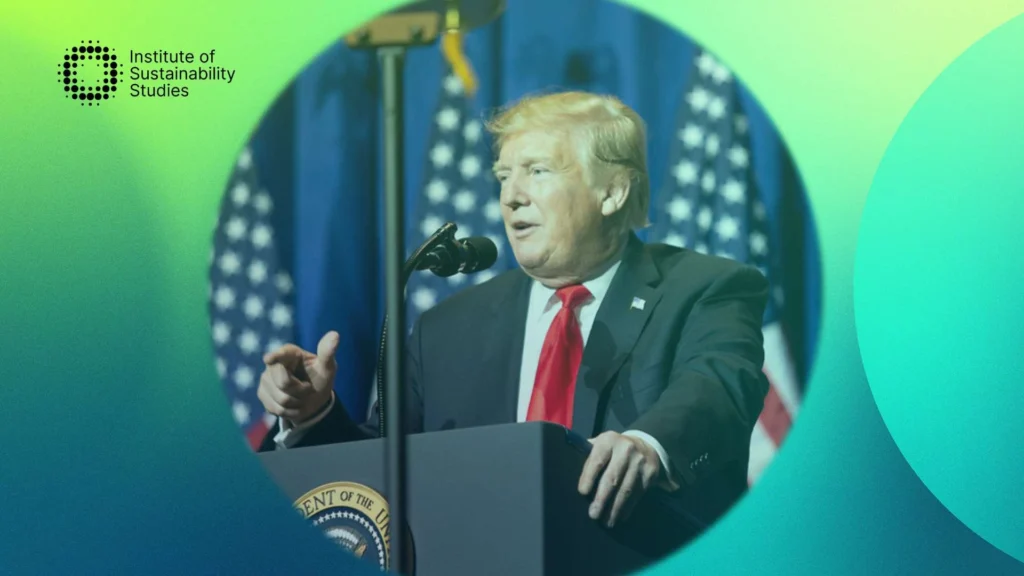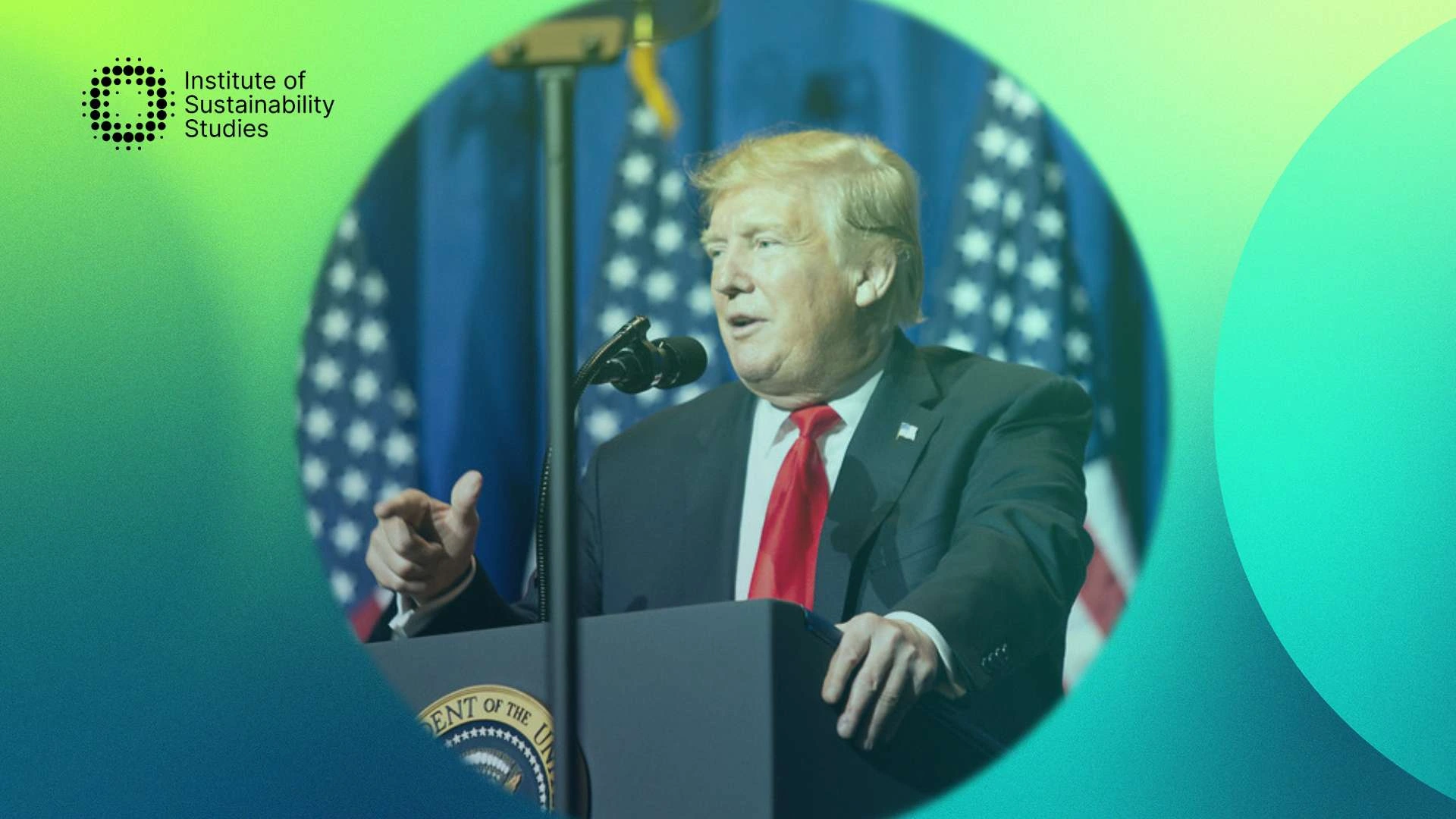In a global economy increasingly defined by political tensions and economic uncertainty, businesses worldwide face a complex challenge: how to maintain their business sustainability strategies while navigating new tariff regimes. The recent implementation of Trump tariffs has sent ripples across international markets, forcing companies in virtually every country to reconsider supply chains, pricing strategies, and long-term investments. Understanding the implications of Trump tariffs is essential for businesses committed to sustainability in this changing landscape. Yet amid these challenges lies an opportunity to reinforce the business case for sustainability – one that transcends political cycles, national borders, and short-term economic pressures.
An overview of the Trump tariffs
The Trump administration’s return to the White House in 2025 has brought with it a renewed emphasis on protectionist trade policies. The latest round of tariffs represents an expansion of previous trade approaches, with far-reaching implications of Trump tariffs for global commerce and sustainability efforts across continents.
The new tariff structure includes:
- A universal 10 percent tariff on nearly all US imports not already subject to other duties.
- Elevated 60 percent tariffs on Chinese goods, up from previous rates of 25-30 percent.
- New tariffs ranging from 25-40 percent on Mexican and Canadian-manufactured goods.
- Specific duties on steel (25%), aluminium (10 percent), and solar panels (30 percent).
- Additional targeted tariffs on electric vehicles and their components (100 percent).
These measures have triggered retaliatory tariffs from affected nations, creating a complex web of trade barriers that impact virtually every global supply chain. The European Union has responded with its own tariffs on American goods, while ASEAN countries have formed new trading blocs to mitigate impacts. Meanwhile, China has implemented countermeasures affecting agricultural exports and technology transfers.
Unlike previous tariff regimes that focused primarily on industrial goods, the current landscape involves duties that encompass consumer products, raw materials, and even certain services through digital trade restrictions. The ripple effects extend far beyond US borders, affecting businesses in every region of the world.
This fragmentation of global trade creates significant challenges for sustainability efforts worldwide, which rely heavily on international cooperation, technology transfer, and integrated supply chains to advance environmental goals.
Equip your team to deliver measurable impact through practical, organisation-wide sustainability training
Implications of Trump tariffs by industry
The ripple effects of these tariffs vary considerably across sectors and regions, with particular relevance to key industries focused on sustainability transformation. The implications of Trump tariffs for businesses represent both challenges and potential catalysts for innovation across global markets:
Manufacturing
Perhaps no sector faces more complex challenges than manufacturing. Companies worldwide now confront substantially higher costs for components, machinery, and raw materials crossing borders affected by the new tariff landscape. For manufacturers with global supply chains, particularly those with connections to Chinese production or US markets, the cascading effects represent a potential operational crisis.
Paradoxically, while challenging for individual companies regardless of location, these pressures may accelerate certain sustainability innovations globally. Manufacturers in Europe, Asia, and the Americas are now more incentivised to explore circular economy models that reduce dependence on cross-border supply chains, invest in resource efficiency, and develop regional manufacturing clusters – all of which can reduce environmental footprints while building resilience.
Construction
The construction industry faces a parallel set of challenges across continents, with tariffs significantly impacting the cost of steel, aluminium, lumber, and specialised construction materials in a globally interconnected market. These increases arrive at a particularly difficult moment, as the sector worldwide was already working to balance economic pressures with the need to adopt more sustainable building practices.
In North America, the 25 percent tariff on steel has increased costs for LEED-certified commercial projects by approximately 8-12 percent, according to industry analysts. But the effects extend much further. Construction firms in Southeast Asia, which had been importing specialised sustainable building materials from both China and the US, now face higher costs from both sources as trade disputes intensify. Similarly, European developers see ripple effects as global steel and aluminium markets adjust to new trade flows.
However, progressive construction companies from Singapore to Stockholm are finding that these challenges strengthen the case for integrated design approaches that minimise material use while maximising energy efficiency. The rising costs of traditional construction materials make alternative approaches, including mass timber, recycled materials, and modular construction, relatively more competitive in every market.
Apparel
The apparel industry, with its notoriously complex global supply chains spanning multiple continents, faces particular disruption from the changing tariff landscape. Major brands headquartered in Europe, North America, and Asia that had already been working to improve sustainability performance now face pressure to completely reconfigure their multinational supplier networks.
Fast fashion companies based in countries like Spain, Japan, and the UK, which rely heavily on production centres across Southeast Asia and Latin America, face significant challenges as materials and finished goods across multiple affected borders. A cotton t-shirt might involve raw materials from India, processing in China, manufacturing in Vietnam, and distribution centres in Europe and North America, with new tariffs potentially affecting multiple steps in this journey.
However, sustainability leaders in the industry, from sustainable startups in Copenhagen to established brands in Australia, see an opportunity in this disruption. The elevated costs of traditional global manufacturing and shipping make more sustainable approaches, including regionally-focused production, on-demand manufacturing, and circular fashion models, increasingly cost-competitive across all markets.
Healthcare
The healthcare sector faces a complex set of global challenges, particularly regarding pharmaceutical components, medical devices, and specialised equipment. The interconnected nature of medical supply chains means that tariff impacts ripple through healthcare systems worldwide.
With approximately 70 percent of active pharmaceutical ingredients globally manufactured in just a handful of countries (primarily China and India), the shifting tariff landscape affects healthcare providers from Toronto to Tokyo. European hospital systems face increased costs for American-made medical equipment, while Asian healthcare providers contend with higher prices for specialised pharmaceutical ingredients that cross affected trade routes.
However, these challenges are accelerating interest in more sustainable healthcare models worldwide. In Australia, the UK, Germany, and beyond, we’re seeing growing investment in waste reduction initiatives, energy efficiency improvements in healthcare facilities, and regionally distributed production of critical supplies. Healthcare systems across multiple continents that had already invested in sustainability as a cost-saving measure now find themselves better positioned to weather tariff-induced price increases, regardless of their geographical location.
Professional Services
While services face fewer direct tariff impacts, professional service firms supporting international trade face significant challenges navigating the new complexity. Consulting firms, legal services, and financial institutions from London to Mumbai must rapidly develop expertise in the evolving global trade landscape.
International law firms with offices across Europe, Asia, and the Americas are experiencing surging demand for trade expertise, while global accounting networks scramble to advise clients on the tax implications of restructured supply chains. Regional differences in regulatory responses create additional complexity, with professional service providers needing to understand not just US tariff policies but the cascading effects and countermeasures implemented across multiple jurisdictions.
For sustainability-focused professional services worldwide, this presents an opportunity to demonstrate how environmental and social governance expertise creates tangible business value in uncertain times. Organisations from every region need guidance not just on tariff compliance within their home markets, but on integrating global tariff considerations into broader sustainability strategies that work across borders.
What businesses can do in the face of Trump tariffs?
Despite the wide-ranging implications of Trump tariffs for companies worldwide, forward-thinking businesses across all continents can take several approaches to maintain both competitiveness and sustainability commitments:
Reimagine supply chains through a sustainability lens
Rather than simply relocating supply chains to avoid specific tariffs, companies from Europe to Australia to South America can use this moment to fundamentally rethink their approach to sourcing. This might include:
- Developing regional manufacturing clusters that reduce cross-border transportation while building local economic resilience.
- Investing in vertical integration strategies tailored to regional strengths and resources.
- Creating closed-loop material systems that reduce dependence on globally traded virgin materials.
- Building redundancy with suppliers across multiple regions, all committed to comparable environmental standards.
Double down on resource efficiency
With globally traded materials becoming more expensive and less predictable, the business case for resource efficiency has never been stronger for companies in every region:
- Invest in technologies that reduce material waste in production processes, applicable in facilities from Singapore to Brazil.
- Optimise product design to minimise resource intensity based on locally available materials.
- Explore product-as-service models that maximise the utilisation of physical assets, which can be implemented in any market.
- Implement comprehensive energy efficiency programs that reduce operational costs regardless of location.
Leverage sustainability as a competitive advantage globally
In markets worldwide where competitors face similar trade pressures, sustainability performance can become a meaningful differentiator:
- Emphasise to customers across all regions how sustainability initiatives reduce costs and improve resilience.
- Highlight to global investors how environmental performance positions the company for long-term success, regardless of trade policies.
- Attract and retain international talent by demonstrating a commitment to universal environmental values despite regional economic headwinds.
- Use globally recognised sustainability metrics to demonstrate operational excellence and management quality to stakeholders in every market.
Advocate for policy consistency across borders
While navigating immediate tariff challenges, businesses should also engage in the policy conversation at multiple levels:
- Work with industry associations in Europe, Asia, North America and beyond to advocate for harmonised approaches to green technologies and materials.
- Participate in international standards development to ensure environmental considerations are incorporated into trade agreements worldwide.
- Collaborate with policymakers across regions to develop transition plans that protect both economic and environmental interests.
- Build multinational coalitions with businesses committed to sustainability regardless of political climate or geography.
Beyond policy: the global, enduring business case for sustainability
While political winds shift and tariff regimes evolve differently across regions, the fundamental business case for sustainability remains constant worldwide. Climate change, resource constraints, and changing consumer expectations create imperatives that transcend both short-term economic pressures and national borders.
The most successful organisations across every continent will be those that can navigate these immediate economic headwinds while keeping sight of the horizon. European firms facing increased costs for American goods, Asian manufacturers navigating complex tariff networks, and Latin American companies adapting to changing trade flows can all benefit from embedding sustainability principles into their response strategies.
As businesses worldwide navigate these complex global waters, sustainability education and capability building become more valuable, not less, in times of economic disruption. Organisations that equip their teams with the knowledge and skills to understand the implications of Trump tariffs and integrate environmental considerations into everyday business decisions will pay dividends regardless of the political climate or tariff regime in any particular market.










